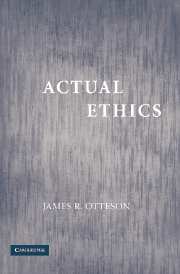Book contents
- Frontmatter
- Contents
- Acknowledgments
- Preface
- PART I WORKING OUT THE POSITION
- 1 Personhood and Judgment
- 2 A Matter of Principle, Part One: The Betrayal of Personhood
- 3 A Matter of Principle, Part Two: Personhood Writ Large
- 4 The Demands of Poverty
- 5 The Wealth of Nations
- PART II APPLYING THE PRINCIPLES
- PART III THE END
- Index
- References
3 - A Matter of Principle, Part Two: Personhood Writ Large
Published online by Cambridge University Press: 17 November 2009
- Frontmatter
- Contents
- Acknowledgments
- Preface
- PART I WORKING OUT THE POSITION
- 1 Personhood and Judgment
- 2 A Matter of Principle, Part One: The Betrayal of Personhood
- 3 A Matter of Principle, Part Two: Personhood Writ Large
- 4 The Demands of Poverty
- 5 The Wealth of Nations
- PART II APPLYING THE PRINCIPLES
- PART III THE END
- Index
- References
Summary
WHAT IS LEFT?
Where on earth does the argument so far leave us? If, as I argued in the previous chapter, socialistic states are morally unacceptable, and if likewise the welfare state, even when it officially recognizes the importance of judgment, still violates people's personhood, what is left? Can we have no state? Does the conception of personhood I have defended entail anarchism—and, if so, does that not constitute a reductio ad absurdum refutation of it?
There are indeed many who would argue for anarchism, or something approximating it, on the basis of the premises I have defended. Economists Bruce Benson, Walter Block, and Hans-Hermann Hoppe, political theorists Anthony de Jasay, Fred Foldvary, and David Friedman, law professors Randy Barnett and Robert Ellickson, and philosophers J. C. Lester, Tibor Machan, Jan Narveson, and Robert Paul Wolff are among those who have recently defended positions that approximate the anarchist or “anarcho-capitalist” view that the only legitimate form of social organization is one that includes no coercive state. And numerous historical figures from many disparate disciplines have argued for similar positions. There are in fact more defenders of this view than one might think, especially given how little they are publicly discussed today; the list of recent advocates above is but a fraction of the authors it would not take you long to discover if you looked into it.
- Type
- Chapter
- Information
- Actual Ethics , pp. 102 - 128Publisher: Cambridge University PressPrint publication year: 2006



